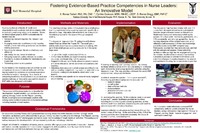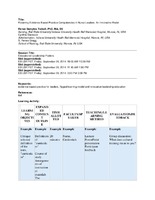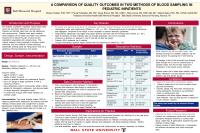| dc.contributor.author | Twibell, K. Renee Samples | en |
| dc.contributor.author | Gregg, S. Renee | en |
| dc.contributor.author | Davisson, Cynthia | en |
| dc.date.accessioned | 2015-01-15T13:35:57Z | |
| dc.date.available | 2015-01-15T13:35:57Z | |
| dc.date.issued | 2015-01-15 | |
| dc.identifier | LEAD14PST79 | en |
| dc.identifier.uri | http://hdl.handle.net/10755/338345 | |
| dc.description | <p>Leadership Summit 2014 Theme: Personal. Professional. Global. Held at the Indianapolis Marriott Downtown, Indianapolis.</p> | en |
| dc.description.abstract | <p>Session presented on Friday, September 26, 2014: Effective nursing leaders at all levels of health care organizations and academic institutions worldwide require skills in evaluating and using sound evidence in practice.The seven evidence-based practice competencies for leaders include: (a) generating relevant inquiries that research can answer; (b) engaging resources to address priority inquiries, including shared governance systems; (c) searching for relevant literature in effective, efficient ways; (d) identifying the best levels of evidence; (e) critiquing research studies relevant for leaders; (f) appraising clusters of studies for readiness-to-use in practice; and (g) translating evidence into practice. Nurse leaders often express a lack of confidence and competence in research-related skills, and admit to basing leadership decisions on personal experience or traditional ways of managing. As a means of enhancing leadership development in educational and practice settings, an innovative approach to elevating evidence-based practice skills was designed and trialed. The purpose of this presentation is to describe the development, implementation, and evaluation of a gaming strategy, based on the flipped learning model, to enhance evidence-based practice skills among nurse leaders in academic and practice settings, including bedside clinical leaders. The game activity, also called a discussion map, was titled Puzzling About Evidence-based Practice: When the Pieces Fit. The theme of the map was putting together a puzzle, which reflected the cognitive activities of analysis, synthesis, and evaluation required in evidence-based practice. The game activity occurred in an educational classroom session; length of the session was 3.5 hours. Attendance was limited to 25 participants who registered for the session in advance and received email communication to prepare them for the session. One primary facilitator, who was an expert in nursing research, education, and leadership, led the session. Support facilitators, specifically advanced practice nurses and nurse educators, filled the instrumental roles of evidence-based practice coaches throughout the session. In applying principles of the flipped learning model, attendees completed pre-reading of a research study, which was selected by session facilitators to align with attendees general areas of leadership and interest. The pre-reading assignment formed the basis for the interactive map activities. The flipped learning model is a relatively new approach to learning and is attracting attention in many countries of the world. A team-building exercise strategically opened the educational session to create a positive tone about research and begin building relationships among attendees. Attendees then gathered in groups at tables with colleagues in similar leadership roles. For example, current or potential nurse managers in attendance might group at one table, having all read a pre-assigned research study on nurse empowerment. Undergraduate students in a psychiatric nursing course would gather at a table, having read a study on closure of relationships in institutional settings. The maps on each of the tables were set up in advance to contain questions and activities specifically drawn from the study the participants read. Mini-lectures of 4-10 minutes were followed by small group application activities at various stations on the map. In the application activities, participants worked in partnerships and small groups to explore strategies for stimulating relevant clinical questions, collaborating for resources to address questions, literature searching for evidence, critiquing research studies, and appraising clusters of research studies. In order to answer the question, Is this good research?, the critiquing activities emphasized the evaluation of the research design, sampling plan, data collection methods, instrumentation, protection of human subjects, and statistical analysis. In appraising clusters of studies, learners answered the question, Is this collection of evidence ready to be used in practice? Session facilitators provided at-the-elbow coaching for the critiquing and appraising activities, so that learners could have questions answered quickly and could try out new ideas with immediate feedback. The game ended with a discussion of translation of evidence into practice, based on principles of implementation science. Learners collected puzzle pieces as they moved through the content areas of the map. At the end of the activity, if all of the learning activities were completed accurately, the pieces fit together in a final, completed puzzle. Target outcomes based on Kirkpatricks model (1998; 2009) included satisfaction, self-assessment of knowledge and skills, self-efficacy in evidence-based practice, changes in behavior and practice, and perceived value of research in achieving patient outcomes through a leadership role. Participant feedback has been consistently positive in the five years the map has been in use.</p> | en |
| dc.format | Text-based Document | en |
| dc.language.iso | en | en |
| dc.subject | Evidence-based Practice for Leaders | en |
| dc.subject | Innovative Leadership Education | en |
| dc.subject | Flipped Learning Model | en |
| dc.title | Fostering evidence-based practice competencies in nurse leaders: An innovative model | en |
| dc.type | Poster | en |
| dc.rights.holder | <p>
All rights reserved by the author(s) and/or publisher(s) listed in this item record unless relinquished in whole or part by a rights notation or a Creative Commons License present in this item record.
</p><p>
All permission requests should be directed accordingly and not to the Sigma Repository.
</p><p>
All submitting authors or publishers have affirmed that when using material in their work where they do not own copyright, they have obtained permission of the copyright holder prior to submission and the rights holder has been acknowledged as necessary.
</p> | |
| dc.description.note | <p>Items submitted to a conference/event were evaluated/peer-reviewed at the time of abstract submission to the event. No other peer-review was provided prior to submission to the Henderson Repository.</p> | en |
| dc.type.category | Full-text | en |
| dc.evidence.level | N/A | en |
| dc.research.approach | N/A | en |
| dc.contributor.department | Beta Rho at-Large | en |
| dc.author.details | Renee Samples Twibell, PhD, RN, CNE; S. Renee Gregg, DNP, FNP-C; Cynthia Davisson, MA, RN | en |
| dc.conference.name | Leadership Summit 2014 | en |
| dc.conference.host | Sigma Theta Tau International | en |
| dc.conference.location | Indianapolis, Indiana, USA | en |
| dc.date.conferenceyear | 2014 | |
| dc.contributor.affiliation | Ball State University, Muncie, Indiana, USA | en |
| dc.description.reviewtype | Abstract Review Only: Reviewed by Event Host | en |
| dc.description.acquisition | Proxy-submission | en |






